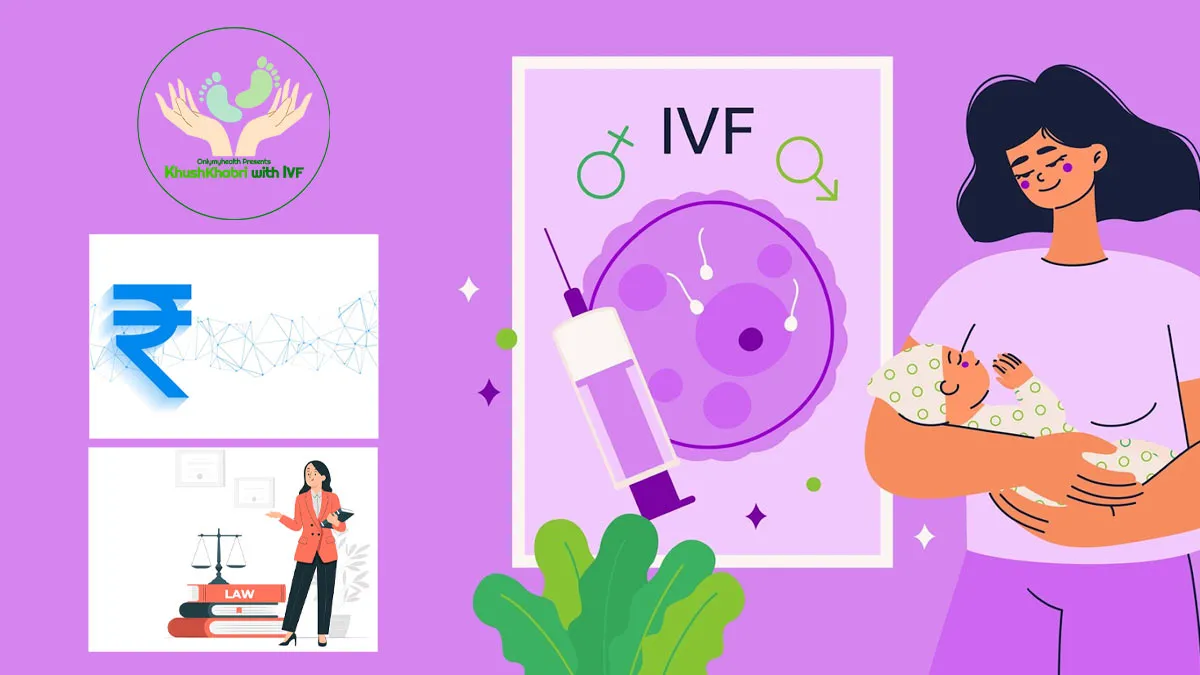
IVF (In Vitro Fertilization) has been a life-changing solution for many couples facing infertility. It offers them the chance to experience the joy of parenthood. But also, when one looks beyond the medical, there are legal and financial consequences to consider. Our 'KhushKhabri with IVF' campaign extensively covers everything related to IVF to create awareness and tackle lack of information
Table of Content:-
“I have seen how an adequate knowledge in these matters soothes concerns and helps in guiding couples through the process with assurance,” shares Dr. Saarthak Bakshi, Healthcare Entrepreneur and CEO of RISAA IVF.
Here’s what you need to know to make informed choices on your path to parenthood.
Legal Aspects of IVF in India
Understanding the legal framework of IVF is essential for ensuring a smooth process. India has strict laws and regulations in place to protect the rights of both patients and donors. It also ensures ethical practices in assisted reproductive technologies.
The Assisted Reproductive Technology (Regulation) Act, 2021
The ART Act, 2021, regulates IVF and other fertility treatments in India. It ensures ethical practices, standardizes procedures, and protects the rights of patients. Under this law, clinics must be registered, and only certified professionals can perform ART procedures.
Also Read: HIV And Fertility: Expert Explains The Challenges And How IVF Can Make Parenthood Possible
Eligibility Criteria for IVF Treatment
“Couples opting for IVF must be legally married and within the reproductive age as per the ART Act. Single women and widows can also undergo IVF using donor sperm. However, it is also important to note that surrogacy is restricted to legally eligible couples under specific conditions.” quotes Dr. Saarthak Bakshi, Healthcare Entrepreneur and CEO of RISAA IVF.
Surrogacy Laws in India
The Surrogacy (Regulation) Act, 2021, prohibits commercial surrogacy but allows altruistic surrogacy for married Indian couples facing infertility. The couple must
fulfill legal criteria for IVF and get necessary approvals before proceeding with the surrogacy procedure.
Donor Egg and Sperm Regulations
Donor gametes (sperm or eggs) are allowed in IVF but must be sourced from certified banks. The donor’s identity remains confidential, and strict medical screening is mandatory to ensure genetic and health safety.
Embryo Storage and Disposal Regulations
In India, the ART Act 2021 allows embryos to be stored for up to ten years. After this period, couples must either let them perish or donate them for research with proper consent. The law also ensures that embryos cannot be used for anyone else without the couple’s explicit approval.
Also Read: Cost And Effects Of IVF Treatment In India, Doctor Elucidates
Financial Aspects of IVF in India
IVF treatment can be expensive, and financial planning is important for couples. Understanding the costs, available financial support, and insurance options can help ease the burden and make the process more accessible.
Cost of IVF Treatment
The cost of IVF varies based on clinic reputation, location, and individual medical requirements. A single IVF cycle can range between INR 1.5 to 3 lakh, excluding additional costs like medications, donor sperm/eggs, or genetic testing.
EMI and Loan Options for IVF
Understanding the financial burden, many IVF centers, including RISAA IVF, offer EMI options and partnerships with financial institutions for 0% interest loans. This makes IVF accessible to more couples who may struggle with upfront payments.
Insurance Coverage for IVF
Currently, most health insurance policies in India do not cover IVF costs. However, with growing awareness, some insurers are introducing fertility-related coverage. Couples should check their policies for any benefits related to fertility treatments.
Government Schemes and Subsidies
Certain states in India offer financial assistance or subsidized IVF treatments for low-income couples. Additionally, some corporate organizations provide IVF coverage as part of employee health benefits.
Conclusion
Being informed about the legal and financial aspects of IVF can help couples plan better and avoid unnecessary complications. At RISAA IVF, we make this journey as smooth and transparent as possible. We also ensure that every couple has the opportunity to experience the joy of parenthood.
Also watch this video
Read Next
What Is Intracytoplasmic Sperm Injection (ICSI)? Expert Details The IVF Fertility Treatment
How we keep this article up to date:
We work with experts and keep a close eye on the latest in health and wellness. Whenever there is a new research or helpful information, we update our articles with accurate and useful advice.
Current Version